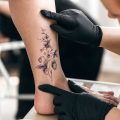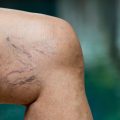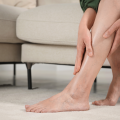Search a topic
Last updated on April 22, 2024
Spider veins are like tiny purple and red threads, visible just under the skin’s surface. While they are generally harmless, they can still be an unwelcome addition to your pregnancy. So, we’ve written up everything you need to know about spider veins in pregnancy, from why they pop up to how to get rid of them.
Why do spider veins appear
Spider veins develop when the one-way valves that stop the backward flow of blood fail. In some cases, they can also form with sudden, excessive blood pressure that overwhelms the little vein, causing it to burst.
Unfortunately, pregnancy puts these risks into overdrive.
- Progesterone levels increase, relaxing vein walls and making it harder for your vein valves to close.
- Your abdomen expands and grows heavier, putting more pressure on the veins around your legs and stomach.
- Blood volume increases to supply your growing baby – meaning the veins are more likely to get overwhelmed.
So as a result, you may start noticing more and more of these thin, red-purple veins threading along your stomach and thighs.
Can you stop spider veins from forming in pregnancy?
While there’s no 100% foolproof way to stop spider veins from forming (especially if you have a genetic predisposition to spider and varicose veins), certain steps can minimise your risk. These include:
Gentle exercise
It will boost your circulation enough to keep your veins happy without causing you much strain or discomfort in the process. A few good exercises to try include:
- A 30-minute walk
- Swimming (ideally somewhere you can stand up with ease, just in case)
- Warrior, Bird Dog, and Plank will strengthen your legs and core while Legs-Up-The-Wall stretches your hamstrings and reduces the gravitational strain on your leg veins. Along with vein benefits, some studies note that antenatal yoga can improve fetal health, reduce back pain, and improve labour and delivery outcomes.
Compression
Compression stockings can ease the pressure on your leg veins. These garments work by activating your calf muscle and gently squeezing blood from tiny, congested surface veins and into the deep veins.
Healthy diet
You’re already going to be eating a lot of vitamins and nutrients to keep your baby healthy. Just double-check that you’re getting a good dose of vitamins C, D, and E, as well as fibre, flavonoids and antioxidants. These are essential in keeping your vein walls strong and healthy. You can find them in foods like:
- Guava
- Papaya
- Strawberries
- Blueberries
- Eggs
- Fish
- Leafy greens
- Oats
- Chia seeds
Elevate your legs
Kick your feet up on some cushions when you’re sitting or lying down. Getting your feet at or just above heart level for a few minutes a few times a day will ease the pressure on your hard-working veins.
Move around
Get up and move every 30 minutes of sitting or standing. Whether you walk, stretch, or do some calf raises, a couple of minutes of movement will boost your circulation and prevent blood from stagnating in the veins.
Will spider veins go away after pregnancy?
In some cases, spider veins that form during pregnancy are only temporary. Once you deliver your baby and your progesterone levels, blood volume, and abdominal pressure decrease, the spider veins will shrink.
However, there is a chance that the spider veins won’t disappear on their own. But don’t worry. There are a few treatments that can get rid of them.
How to get rid of spider veins
Spider veins can be treated in a few ways, including sclerotherapy, transdermal (topical) laser, and endovenous (internal) laser.
They can also be treated through a combination method known as CLaCS (Cryo Laser and Cryo Sclerotherapy). First, we use the laser to shrink the veins and then inject a sclerosant which agigates the vein walls and seals them shut for your body to absorb over time. During treatment, we use cryotherapy to cool the skin and minimise the discomfort of the laser heat.
If your spider veins don’t go away after pregnancy, give us a call at 0483948908.





